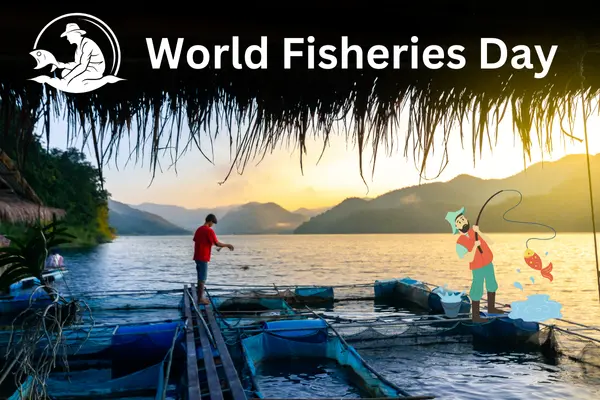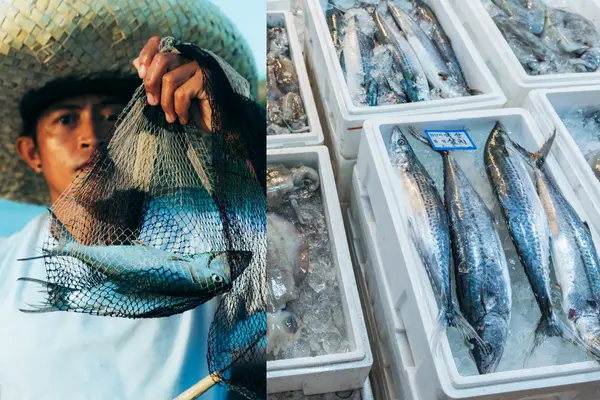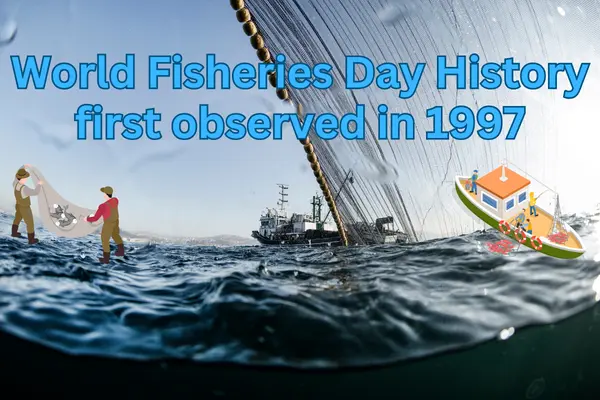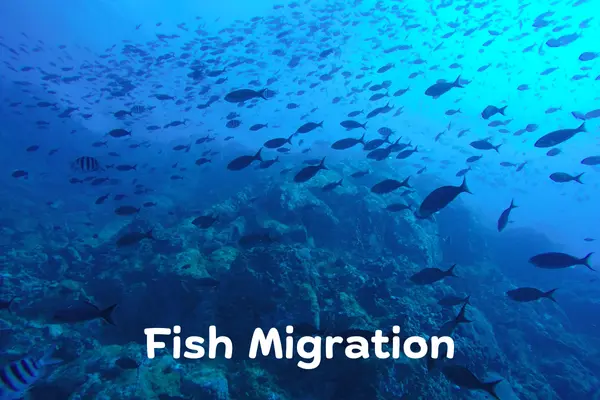World Fisheries Day: Commemorating the Lifeline of Aquatic Systems
Updated: 22 Dec 2024
131
On every 21st of November, a global celebration known as the World Fisheries Day seeks to raise
awareness on the importance of fisheries and aquatic systems in supporting life, income, and
ecology. Landings conducted in honour of this day underscore matters of sustainable fishing, the
livelihood of fishers and the status of the marine ecosystem. This day also deems worthy in focusing
the importance of fisheries sector in Indian economy and livelihood aspects along the extended sea
frontiers and numerous water bodies are inherent to the Indian geography.

WORLD FISHERIES DAY World Fisheries Day is a remembrance and a call to validate the value of
fisheries and aquaculture for all citizens rounded the global.
What Are The Origins Of World Fisheries Day?
World Fisheries Day was first celebrated in 1997 when the World Forum of Fish Harvesters and Fish
Workers was formed in New Delhi, India. Members from 18 countries attended the launching of the
World Fisheries Forum aimed at promoting responsible fishing.
- Historical Importance: Understands the importance of protection of fish stock and
the threat posed by over fishing. - Global Adoption: It was accredited by food and agricultural organization-FAO in 2003
to foster the global fisheries industry that is facing several threats.
World Fisheries Day should be celebrated because of the following reasons:
Fisheries provide critical resources:

- Food Security: Fish supplies over 20% of animal protein for more than 3 billion
people in the world. - Livelihoods: Provides support to over 58 million employees globally, including rural
workers. - Biodiversity Conservation: Facilitates the management of aquatic ecosystems in a
manner that is ecological, economically and socially responsible.
The third largest producer of fish in the world.
The second largest producer of aquaculture in the world after China.
The biggest exporter of shrimp and plays a very important role in the export of seafood around the world. Fishries Day, observed annually on November 21, shines a spotlight on the pivotal role of fisheries and
aquatic ecosystems in sustaining life, livelihoods, and environmental balance. This global observance
highlights the importance of sustainable fishing practices, the welfare of fishing communities, and
the conservation of marine biodiversity. For India, with its extensive coastline and rich inland water
resources, this day also emphasizes the significance of the fisheries sector as a backbone of the
economy and a source of employment.
The Origins and Purpose of World Fisheries Day
How Did World Fisheries Day Begin?

World Fisheries Day was first observed in 1997 during the establishment of the World Forum of Fish
Harvesters and Fish Workers in New Delhi, India. Representatives from 18 countries gathered to
form the World Fisheries Forum, advocating for sustainable fishing practices.
- Historical Importance: Recognizes the need for conservation and the dangers of
overfishing. - Global Adoption: Officially recognized by the Food and Agriculture Organization
(FAO) in 2003 to address the challenges threatening fisheries globally.
| Why Is World Fisheries Day Important? |
|---|
Fisheries provide critical resources:
|
The Fisheries Sector in India
India’s Global Standing

India ranks as:
- The third-largest fish producer globally.
- The second-largest aquaculture producer after China.
- The largest shrimp exporter, contributing significantly to global seafood trade.
Contribution to the Economy
- Employment: More than 30 million inhabitants, mostly from the coastal and rural
sectors, are engaged in fisheries. - Blue Economy: Fisheries contribute only 1.07% to its GDP but hold importance for
success of targets under PMMSY. - Export Earnings: Has the objective of attaining ₹1 lakh crore in seafood exports by
fiscal 2025.
| Challenges Facing Fisheries |
|---|
|
|
Greening the World’s Fisheries
Initiatives for Conservation
Governments and organizations globally are focusing on sustainable fisheries management:
- National Plan of Action (NPOA) for Sharks: Carries the mission of protecting sharks.
- Marine Fisheries Census: Gathers information about the fish resources with an aim
of improving the kind of policies that are being formulated in the country. - Bay of Bengal Regional Plan of Action (BoB-RPOA): Combats cases of poaching and
piracy in the region.
Blue Economy in India
The Indian government has launched several initiatives:
- Retrofitted LPG Kits: Biodegradable fishing materials to minimize pollution of the
environment. - Single Window System for Aquaculture: Simplifies licensing for fish farmers.
- Community Empowerment: Supports the use of non-mechanized means of fishing
and enhances the capability of petty fishers.
The Timing and Significance of Fish Migration
What Is Fish Migration?
Fish movements include daily, cyclical, or seasonal movements by fish for spawning, feeding or to
escape unfavorable conditions. Examples include:

- Anadromous Species: Adult salmon swim against the current in order to spawn their
eggs. - Catadromous Species: Eels use the fresh water to grow up and then move to the sea
to mate.
Why Does It Matter?
- Ecological Role: It is important in maintaining populations of fish and genetic
variation in stocks. - Economic Impact: Supports fishing industries based on migratory fish stocks.
- Conservation Efforts: Demands that rivers must always be flowing and oceans to be
vibrant.
To mark World Fisheries Day
Global Observance
- World Fisheries Day is celebrated with events emphasizing sustainable practices, including:
- Community Workshops: Raising awareness about environmentally friendly fishing
practices. - Policy Announcements: Governments publish strategies for countering overfishing
and illegality. - Cultural Events: Appreciation of the Fishing Communities.
Activities in India
The Department of Fisheries organizes events, such as:
- Initiating environmental friendly undertakings.
- Carrying out awareness creation on marine conservation.
- Demonstrating participation in traditional fishing methods.
FAQs on World Fisheries Day
What is World Fisheries Day?
World fisheries day is observed on 21st November every year to create awareness on sustainable
fishing and wellbeing of fishermen.
What problems exist in the mentioned sector?
Some of the main problems are fishing impacts, environmental degradation, the changing climate,
and the unauthorised fishing activities.
What role does the fisheries sector play in India?
India Fisheries has a significant impact on GDP, exports, and employment making the fisheries sector
one of the pillars on the Indian economy.
What is fish migration, and why is it important?
Therefore, fish migration is important as it enhances genetic makeup of fish, plays an important role
in ecosystems, and forms grounds for fishing businesses.
What are the measures that can be taken at the individual level for the sustainable fisheries?
Purchase seafood from sustainable sources, minimize use of plastics, and support marine
conservation policies.
Conclusion
This is all part of what World Fisheries Day represents and keeps the world aware of the importance
of fisheries in feeding people, sustaining livelihoods, and maintaining the fabric of our environment.
Land and sea resources can be protected for future food production and livelihood by adopting
sustainable fishing practices and empowering artisanal fishers. It is time to resolve to cherish and
preserve our water bodies at all times.
Sources
- Vajiram & Ravi – World Fisheries Day 2025
- Oliveboard – World Fisheries Day History and Importance
- GKToday – Fisheries in India
Please Write Your Comments